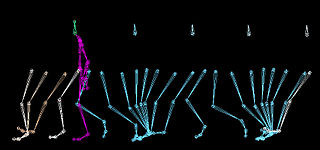
Walking is one of the main gaits of terrestrial locomotion among legged animals. Walking is typically slower than running and other gaits. Walking is defined as an "inverted pendulum" gait in which the body vaults over the stiff limb or limbs with each step. This applies regardless of the usable number of limbs—even arthropods, with six, eight, or more limbs, walk. In humans, walking has health benefits including improved mental health and reduced risk of cardiovascular disease and death.

The Auckland Harbour Bridge is an eight-lane motorway bridge over the Waitematā Harbour in Auckland, New Zealand. It joins St Marys Bay on the Auckland city side with Northcote on the North Shore side. It is part of State Highway 1 and the Auckland Northern Motorway. The bridge is operated by the NZ Transport Agency (NZTA). It is the second-longest road bridge in New Zealand, and the longest in the North Island.

Race walking, or racewalking, is a long-distance discipline within the sport of athletics. Although a foot race, it is different from running in that one foot must appear to be in contact with the ground at all times. Race judges carefully assess that this is maintained throughout the race. Typically held on either roads or running tracks, common distances range from 3,000 metres (1.9 mi) up to 100 kilometres (62.1 mi).

Holiday World & Splashin' Safari, formerly named Santa Claus Land, is a theme park and water park located in Santa Claus, Indiana, United States. The theme park opened in 1946 and features rides, live entertainment, and games that are divided into four sections that celebrate Christmas, Halloween, Thanksgiving, and the Fourth of July.

Juanita High School is a high school in Kirkland, Washington, administered by Lake Washington School District (LWSD). Juanita's feeder schools are Kamiakin Middle School and Finn Hill Middle School, and Bell, Frost, Juanita, Keller, Muir, Sandburg, and Thoreau elementary schools.

The Lunar New Year Fair, also known as the flower market, is a type of fair held annually a few days before Lunar New Year in Chinese New Year markets in China. These fairs are primarily practiced by the Cantonese, and spread with Cantonese immigration.

A walking bus is a form of student transport for young schoolchildren who, chaperoned typically by two adults, walk in a train-like procession. The children may walk to school along a set route, with some similarities to a school bus route, with designated "bus stops" and "pick up times" at which they pick up and "drop off" schoolmates.

The International School of Penang (Uplands), commonly known as Uplands School or simply Uplands, is a boarding international UK-style curriculum international school in Penang, Malaysia. Founded in 1955, it was first situated on Penang Hill, moving to Gurney Drive and finally Batu Ferringhi in 2006. Uplands School is a multicultural, multiracial and multinational community whose aim is to promote the School Motto: "Respect for Self. Respect for Others".

Thomas More College is an independent, Catholic co-educational day school located in Kloof, near Durban in KwaZulu-Natal, South Africa.
A travel plan is a package of actions designed by a workplace, school or other organisation to encourage safe, healthy and sustainable travel options. By reducing car travel, travel plans can improve health and wellbeing, free up car parking space, and make a positive contribution to the community and the environment. Every travel plan is different, but most successful plans have followed a structured process in their development.

Jumpin Gym U.S.A. Ltd. is a family entertainment centre company based in Hong Kong.
In 2007, China launched the Green Transport and Health week campaign to help residents understand the importance of environmental protection and be mindful about saving energy. The campaign ended with a No Car Day Saturday.

Pedestrianism was a 19th-century form of competitive walking, often professional and funded by wagering, from which the modern sport of racewalking developed.

The Turnford and Cheshunt Pits is a biological Site of Special Scientific Interest near Cheshunt in Hertfordshire and Essex and covers a total of 428.17 acres. It is part of the Lee Valley Special Protection Area.
Living Streets Aotearoa Inc. is the New Zealand organisation for people on foot, promoting walking-friendly communities. Living Streets Aotearoa is the national walking advocacy group with the vision of "more people choosing to walk more often."
A walking audit is an assessment of the walkability or pedestrian access of an external environment. Walking audits are often undertaken in street environments to consider and promote the needs of pedestrians as a form of transport. They can be undertaken by a range of different stakeholders including:

Student transport is the transporting of children and teenagers to and from schools and school events. School transport can be undertaken by school students themselves, they may be accompanied by family members or caregivers, or the transport may be organised collectively, using school buses or taxis.
Green Action Centre (GAC) Formally known as the Recycling Council of Manitoba and the Resource Conservation Manitoba is an environmental, non-profit organization based in Manitoba, Canada. It includes promoting greener living through environmental education for households, workplaces, schools, and communities. It also develops and advocates environmental policies for the Manitoba communities. Its primary areas of activity include; green commuting, composting and waste, sustainable living, and resource conservation.

Cycling for transport and leisure enjoys popularity in Greater Manchester and the city also plays a major role in British cycle racing. The Bee Network was launched in 2018. The University of Manchester is home to the Manchester Cycling Lab.
Icknield Walk First School is a larger than average first school located in Royston, Hertfordshire, England. It has approximately 335 registered students and has an overall 'Outstanding' Ofsted rating. The school runs the Rise and Shine Breakfast Club for its pupils and hosts both the Fair Play After School / Holiday Club and the Queens Road Playgroup.













